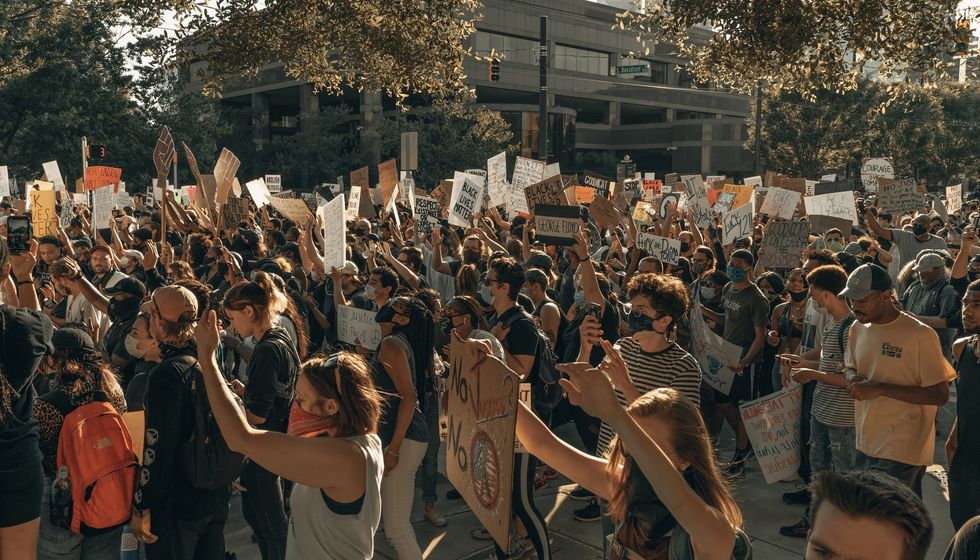The next steps are being taken, in The W.E. Rising Project, a movement that stands against the brutal police force, to make a change against the police brutality and racial inequality in Phoenix.
The W.E. Rising Project met on September 24 for a candlelight vigil for Breonna Taylor and Dian Johnson. They met in downtown Phoenix, and they decided on their next step: voter initiative.
Jacob Raiford, Director of Communications for The W.E. Rising Project, mentions how a movement needs to have a cause, a sort of ending. For the Project, it is legislative change.
"We can't just tell people that we are upset, and expect them to do something about it," Raiford said.
As soon as The W.E. Rising Project was created, around June, the organization didn't wait to take action. It began protesting at the Arizona Unity March, where protestors marched to the Arizona capitol in early June. This march lasted approximately 16 days and had a crowd of roughly 1,000 people, according to AZ Central.
The COVID-19 pandemic didn't stop The W.E. Rising Project attendance at any of the protests. The pandemic might have helped increase the number of people and motivation for this change. According to Raiford, attendance is great. Up to 10,000 - 12,000 people on average are out in the streets protesting.
When the organization creates events, it makes sure to create safety measures. The project enforces masks and sets up stations with electrolytes, water, snacks and hand sanitizer.
"It's almost parental to look after the people that attend the events," Raiford said.
The W.E. Rising Project marches and protests have been effective in the organization's movement to get information out to the Greater Phoenix. Raiford says that this movement came together at a point in time when the communities are being hung and stood over.
When Governor Ducey initiated lockdown and emergency procedures, Black Lives Matter Phoenix Metro and other organizations began to speak up about equality and police brutality issues.
The organizations and communities were able to take that negative energy and channel it towards helping highlight these issues. Raiford mentions that there are cases of racism, within the criminal justice system, that all tie together the greater issues of systematic prejudice against the black and brown community.
CEO of The W.E. Rising Project, Jazlyn Geiger, went to one of the first protests in Phoenix that gathered for the death of George Floyd on May 28. Since that day, she has helped build The W.E. Rising Project and has gone to over 60 protests.
At first, The W.E. Rising Project decided that the "W.E" in their name should stand for "with everyone," because the idea was that they are here for everyone and the whole community. Then the group changed it to "with equity." The group came upon this decision because equality is talked about all the time, but people don't talk about equity enough.
The organization is created with the majority of younger people that all had the same passion, thoughts and beliefs. They formed together during a hard time and set a goal to bring something new to the communities.
Thousands of people show up to The W.E. Rising Project events, either like-minded or willing to learn something. The organization comes together to fight for what they believe in and create strategies to make a change.
"At the end of the day," Raiford said. "Protest, without any endgame, is just performing."
Defunding the police
There has been controversy around the idea of defunding the police and if that could help issues concerning the police.
"Many people have their own belief of what 'defunding the police' means," Geiger said.
At March of Arizona, an organization leader Kenneth Smith spoke about changes the organizations wanted to see. According to AZ Central, they wanted to see diverting funds from the police.
Jacob Raiford says that there is too much money being allocated towards the militarization of a force that is supposed to be protecting its citizens. He explains that the excessive amount of money should be allocated towards communities that need financial reinforcement.
There are certain situations that police officers are not trained to deal with or handle.
Geiger gives the example of a person dealing with mental health issues. If a police officer shows up at someone's door, who is struggling with mental health issues, his or her reactions can be way different and sometimes worse. But some police officers don't understand this, and it can end negatively.
"When it comes to distributing money for the police, there should be redistribution in certain areas to help the police in a better way," Geiger said.
In the first half of 2020, $3.4 million has been spent on military equipment in Arizona, according to an Arizona Mirror analysis.
For Arizona, the general fund budget for the upcoming fiscal year is over $1.4 billion. The Appeal explained that the police department will receive $592 million from the general fund. That is 52% of the general fund budget. This includes an additional $153 million from other city sources, according to The Appeal.
According to AZ Central, protestors gathered around the Phoenix City chambers for a council meeting on June 3.
The protestors demanded to defund the police by 25% and put the money towards programs that will help the community. The council members denied this request.
According to AZ Central, the decision was made for $400,000 to be used for the Office of Accountability and Transparency, which is said to enhance civilian oversight of the Phoenix Police Department.
"There's no reason why that money should be funneled in areas that could be used towards helping the community," Rainford said.






 The minimum wage is not a living wage.
StableDiffusion
The minimum wage is not a living wage.
StableDiffusion
 influential nations
StableDiffusion
influential nations
StableDiffusion







